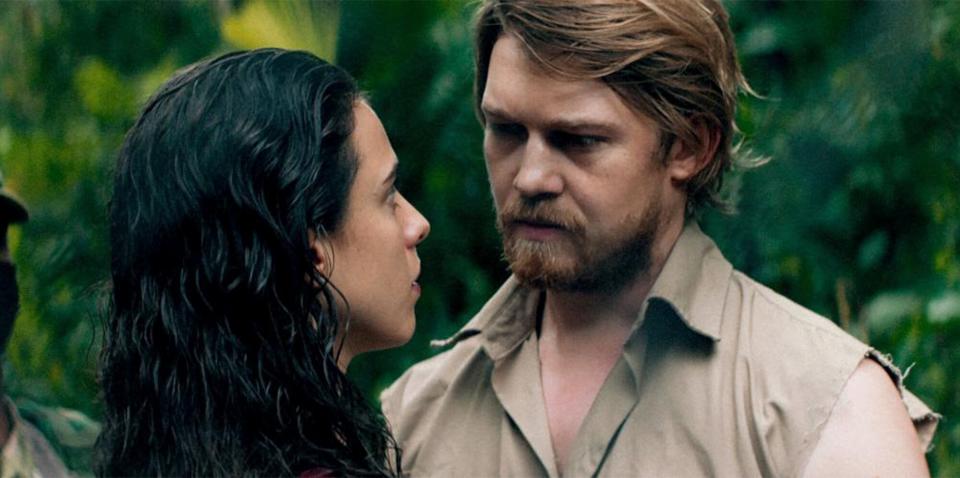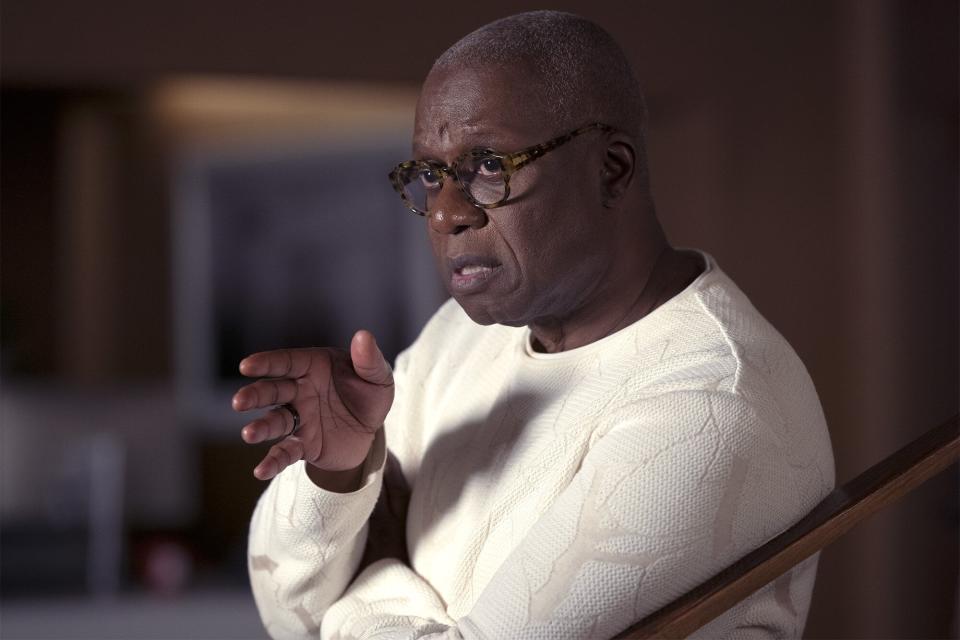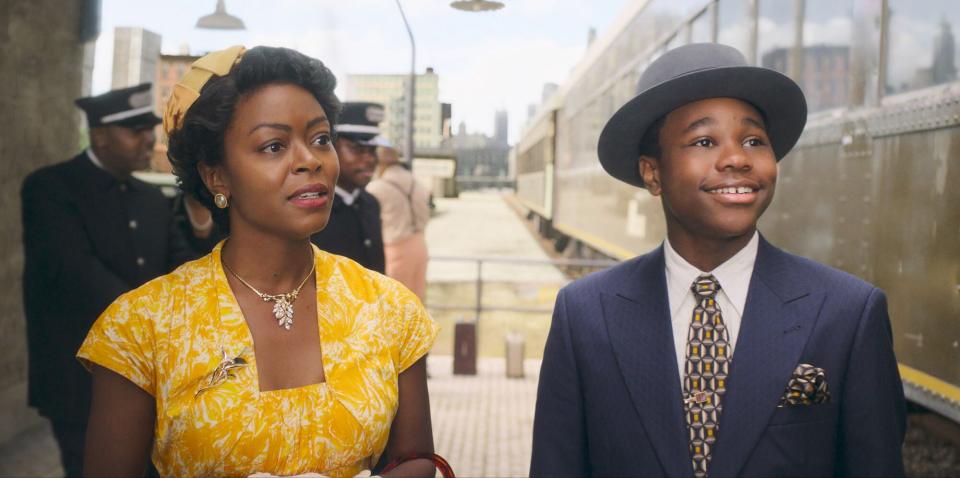Decision to Leave would be a crime to miss, Stars at Noon doesn't shine

- Oops!Something went wrong.Please try again later.
- Oops!Something went wrong.Please try again later.
- Oops!Something went wrong.Please try again later.
- Oops!Something went wrong.Please try again later.
- Oops!Something went wrong.Please try again later.
- Oops!Something went wrong.Please try again later.
- Oops!Something went wrong.Please try again later.
Decision to Leave
In select theaters now

Mubi Tang Wei and Park Hae-il in 'Decision to Leave'
No matter his paintbox, director Park Chan-wook has a way of making even the most familiar genre stuff feel fresh. What the Seoul-born auteur once did for action thrillers (Oldboy), vampire horror (Thirst), and high melodrama (The Handmaiden), he does again for neo-noir in his sleek, mischievous latest: Behold the jaded detective with a soft, secret center; the dangerously alluring femme fatale; the seemingly perfect crime — and the vortex of triple-crossed mystery that ensues when it all begins to come undone.
Park Hae-Il is Hae-jun, a veteran officer summoned to investigate the case of a middle-aged mountain climber whose high-altitude death appears at first to be a simple slip, or a suicide. His beautiful young widow Seo-Rae (Lust, Caution's Tang Wei), though, seems oddly unaffected, almost cavalier; does she know more than her lonely late-night wanderings and phone records show? Hae-jun isn't much of a sleeper either, and soon he's taken to spending insomniac hours beneath her window, his interest quickly surpassing the strictly professional. (Not that there's no one waiting at home; he has a fraught if not unhappy marriage of his own.)
With surreal cinematic flourishes and breezy dollops of dark humor, Park builds a world where alliances are constantly shifting and nearly every moment is cause for reconsideration: You won't know what you don't know until the last frame, and that's just where the real questions start. His virtuoso leads walk a thin line to keep it that way, though a lot of the movie's best color comes in the vibrant supporting characters and small, pliable details of everyday lives — the enduring awkwardness of enforced small talk, the low-boiling envy of a co-worker's superior lunch options — that have little to do with murder or mayhem. Decision to Leave doesn't feel like the boldest or most indelible work of Park's career; his catalog goes too deep, and too wonderfully weird, for that. But it's a delightful rabbit hole to tumble down nonetheless, if you decide to stay. Grade: B+ —Leah Greenblatt
Stars at Noon
In select theaters now

A24 Margaret Qualley and Joe Alwyn in 'Stars at Noon'
Beware the Western filmmaker who travels down to Central America with a prestige novel in hand. After making a pair of excellent movies, Pariah and Mudbound director Dee Rees foundered with 2020's obtuse, overheated The Last Thing He Wanted, set in El Salvador and based on the book of the same name by Joan Didion. Now, Parisian arthouse queen Claire Denis has gone and made her own humid mess of Denis Johnson's The Stars at Noon — losing the definite article of his title and nearly all narrative sense in the process.
Trish (Maid's Margaret Qualley) says she's a journalist, though she spends most of her days in a dangerously destabilized Nicaragua shotgunning rum and half-languorously, half-frantically attempting to get one of her local "protectors" to help untangle the red tape that keeps her from returning to the States. The soft-handed British businessman she meets at a local hotel bar seems like another opportunity to trade sex for the American dollars she needs to buy a flight home, though Daniel (Joe Alwyn, pensive and neck-beardy) turns out to be something more than an easy mark. She's actually attracted to him, and she has no idea what his purpose there is beyond some vague mention of oil companies and philanthropy.
Absurdly, neither do we, which makes the ensuing two-plus hours of intrigue feel both maddeningly opaque and without real stakes. Trapped in a Groundhog-Day roundelay neither of them can seem to escape, the pair fall back on what they do best: drink and have sex. Qualley and Alwyn lay themselves admirably bare (literally; one memorable scene involves nude finger-painting in bodily fluids), but there's so little consistency in their characters' behavior and motivations that the story increasingly seems lost in some kind of dream logic. Actors like John C. Reilly and Benny Safdie drop in to deliver a few inscrutable lines, but it doesn't help that the action has been moved from the 1980s to an iPhone-and-COVID-mask modern day; there's an ugly whiff of casual colonialism in the script, and almost none of Denis' trademark tension and subversive wit. Come for the pretty naked people, if that's what you're into, and the vicarious passport; leave the muddled, ridiculous rest. Grade: C– — Leah Greenblatt
The Good Fight
Streaming Thursdays on Paramount+

Elizabeth Fisher/Paramount+.
There's only one month left before the Good Fight series finale, so let's treasure the impeccably brisk thrills of this week's episode. Ri'Chard (André Braugher) calls everyone to work on a Saturday to help his ailing nephew, who almost got a bone marrow transplant before the donor backed out. It's a ticking-clock plot that almost feels like a bottle episode, given how the breakneck pace of lawsuits and organ-donation schemes forces all the main characters to work closely together on one single case. It's a marvel of narrative efficiency that finds room for kooky delights, like a court case tried entirely at a kid's birthday party. Braugher's a new addition this season, and he's mostly played Ri'Chard with maximum braggadocio. Here, he gets more sensitive moments in, rubbing his gray-fuzz buzz in quiet desperation. And he sings! Episode Grade: A —Darren Franich
Till
In theaters now

Orion Pictures
The abduction, kidnapping, and murder of a 14-year-old Chicago boy named Emmett Till at the hands of two white men in the Jim Crow South became one of the defining moments of the Civil Rights era, a singularly ugly chapter in American history with a still-resonant postscript. Till's story has been recounted in numerous mediums since then, and refracted for decades through the work of artists ranging from William Faulkner to Bob Dylan. Till, similar to ABC's limited series Women of the Movement earlier this year, chooses to approach from a unique if more oblique angle, centering Emmett's mother Mamie Till-Mobley (Danielle Deadwyler) and her valiant, often lonely struggle to find any form of justice and accountability for her son.
The result is a film made with unwavering empathy, and embodied with singular grace and ferocity by Deadwyler (Station Eleven, Watchmen), if also one that feels more impactful as an acting showcase and a diligently pitched history lesson than as a fully formed drama on the screen. Writer-director Chinonye Chukwu (Clemency) deliberately swerves from any explicit recreation of the actual event, confining her narrative mostly to the foreboding before and the pained aftermath.
Instead, she paints a sweet but incomplete portrait — Till was so young when his life was cut short, could it really be any other way? — of a dimpled, exuberant kid (Jalyn Hall) and the family who adores him: His widowed mom, Mamie; her own mother (an affecting but underused Whoopi Goldberg); the kindly fiancé (Sean Patrick Thomas) she's set to marry. They've never been separated, and Mamie can't help repeating her anxious warnings as he prepares to visit his cousins in small-town Mississippi: Be quiet, be respectful, make yourself small; "They have a different set of rules for Negroes down there."
The production and costume design impeccably evoke the signifiers of midcentury style, from the cowboy wallpaper in Emmett's bedroom to Mamie's pressed hair and carefully matched jewelry sets, and the soundtrack pulses with jaunty pop songs and harrowing orchestral swells. What's missing, maybe, in the almost faultlessly respectful script, is a more genuine and textured sense of who the Tills were beyond their defining tragedy. Deadwyler, an actress mostly known until now for standout supporting turns in larger ensembles like The Harder They Fall, brings a haunted immediacy to Mamie even when the screenplay doesn't rise to meet her, grief and fury and fierce dignity passing across her face in annihilating waves. Till-Mobley's choice to let the world see what Mississippi had done to her son — she demanded an open casket at his funeral — helped ignite a movement, and made history. Till bears stirring witness to that, even if it leaves the full measure of her life a mystery. Grade: B — Leah Greenblatt
Want more movie news? Sign up for Entertainment Weekly's free newsletter to get the latest trailers, celebrity interviews, film reviews, and more.
Related content:

